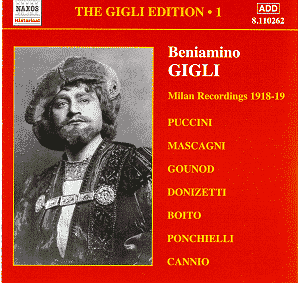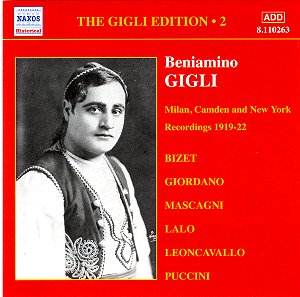Romophone embarked on an extensive Gigli series
beginning in 1996 with the 1921-23 Victors. Further extensive
reissues followed in 1998, covering the early discs under the
rubric Gigli – the Complete HMV Recordings 1918-32. Collectors
should know that since Romophone’s recent demise this new series
from Naxos has embarked chronologically from the beginning, utilising
essentially the same transfers, those of Mark Obert-Thorn. If
you have the relevant Romophones there is no need to invest in
this set, even though Obert-Thorn has taken the opportunity to
tidy up still further his transfers. There are a couple of cases
in volume 2 of the series – also reviewed by me – where he’s re-transferred
two tracks in their entirety.
These are not complete operatic sets of course
but the arias and extracts show Gigli at his most verdant, natural
and effortless. The disfiguring mannerisms that were later to
affect his performances are not so audible here though they are
certainly present in embryonic form. Gigli was twenty-eight when
he first recorded in a year in which he’d just been engaged by
Toscanini at La Scala, the beginning of a recording career that
was to last until his retirement in 1955. The virtues of his youthful
singing are manifold; the top well and evenly produced in the
Boito, the masculine but not over parted Recondita armonia,
the sumptuous legato and portamento of the October 1918 E Lucevan
le stelle with barking held in check even though the actual
effect is still too hammy with its Vesuvian sobs engulfing the
grooves – and us. Admirable is the sheer elegance of his Rivogli
a me from Mefistofele which, though burnished with some weeping
and a squally soprano, Gemma Bosini, who’s no tonal match for
him, is attractive. Much better is mezzo Elvira Casazza in Addio,
fuggir mi lascia where she proves as strong as he is ardent
and lyrical.
In the Ponchielli one can admire the way Gigli
hardens with declamatory force his bridling tone or how, with
ease and generosity, he essays his favourite Neapolitan songs.
If the verismo of Mascagni’s Lodoletta is a mite overdone – allied
to which the orchestra is very swoony, undernourished and sounds
kitted out with reinforcement tubas – it’s still an education
to listen to the application of Gigli’s portamenti here. One of
the peaks of the disc is Cielo e mar, which is sung with
a very special tone – a sustained legato of exquisitely pleading
intimacy. There will always be moments of doubt – for me his excursions
into the French repertoire border on the painful – but when he
is on home ground the delights are infinite. Who could resist
the sotto voce he cultivates in O soave fanciulla?
So, to recommendations. If you have the Romophones
this Naxos is needless duplication. If you don’t have early Gigli
this is a perfect point of entry – excellent transfers of some
occasionally problematic Italian sessions and equally excellent
notes by Alan Blyth.
Jonathan Woolf
See also review
of Volume 1 by Robert Farr
Volume 2
As I wrote in my review of the first volume in
this series Naxos has taken over the reins of early Gigli material.
The 1919 sides here first appeared on now defunct Romophone 82011-2
(Beniamino Gigli – the Complete HMV Recordings 1918-1932). The
transfers in both cases are by Mark Obert-Thorn and have been
slightly improved for this issue and he has also re-equalised.
A couple of tracks have been re-transferred - the Bizet and Vedi,
io piango from Giordano’s Fedora. Otherwise all is well. The
voice is still fresh, beautifully produced, with stunning sotto
voce and portamenti, and a legato ease unhindered by technical
deficiencies.
That said we get off to a relatively poor start
with Suzel buon di where he’s joined by a poor soprano
and a worse band. Even though his excursions into the French repertoire
were hardly models of Gallic sensitivity there is nevertheless
something rather touching about the Pearl Fishers duet with Adolfo
Pacini. His Recondita armonia, his second attempt following
the earlier sessions, is again good but not outstanding and the
similarly newly recorded New York E lucevan le stelle is
once again rather over emoted. But the 1921 Camden, New York Cielo
e mar! is once more magnificent – fullness across the range
with an almost quasi-baritonal extension downwards, and an extreme
ease of vocal production, with considerable and magnificently
deployed dramatic reserves at the end.
In Spirto gentil he softens his consonants,
employs a couple of distinct downward portamenti and engages in
very slight ritardandi and caesuri. Here technique and tension
are in perfect accord and there’s very little here for Gigli doubters
who think he will succumb to histrionics at every turn. Once again
his Gounod gets no better over the intervening years; as with
the earlier Milan recording, on Volume 1 of Naxos’ set, this is
very Italianate and very sedate. It’s good to hear the Neapolitan
selections – as with nearly all the sides these are presented
in strict chronological order – complete with guitar and mandolin
accompaniment. As it is indeed to his truly thrilling aria from
Act I of Andrea Chénier, Un di all’azzurro spazio.
If you don’t have the Romophone these transfers
very much reclaim the central place in the young Gigli’s discography.
Surface noise is much less of a problem in the well-engineered
American Victors – and the notes are by Alan Blyth and William
Ashbrook.
Jonathan Woolf



